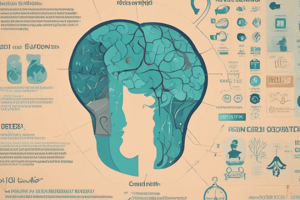Podcast
Questions and Answers
What is the primary aim of health sciences research?
What is the primary aim of health sciences research?
- To change healthcare legislation
- To prove existing theories wrong
- To generate trustworthy evidence in practice and education (correct)
- To create new medical technologies
Which of the following conditions has CBD been reported to alleviate?
Which of the following conditions has CBD been reported to alleviate?
- Bone fractures
- Hearing loss
- Chronic pain (correct)
- Vision impairment
Which characteristic is NOT associated with research?
Which characteristic is NOT associated with research?
- Systematic enquiry
- Diligent investigation
- Randomized results (correct)
- Process-oriented approach
What contributes to quality care in health sciences?
What contributes to quality care in health sciences?
Which of the following is a systematic investigation of a subject called?
Which of the following is a systematic investigation of a subject called?
Which of the following areas does health sciences research NOT typically focus on?
Which of the following areas does health sciences research NOT typically focus on?
What role does ethics play in health sciences research?
What role does ethics play in health sciences research?
What is the primary aim of inductive research?
What is the primary aim of inductive research?
Which aspect of evidence-informed care focuses on the availability of healthcare to everyone?
Which aspect of evidence-informed care focuses on the availability of healthcare to everyone?
What does the concept of efficiency in healthcare treatment refer to?
What does the concept of efficiency in healthcare treatment refer to?
In the deductive approach, what is primarily tested?
In the deductive approach, what is primarily tested?
Which method of knowledge acquisition emphasizes hands-on learning and experimentation?
Which method of knowledge acquisition emphasizes hands-on learning and experimentation?
What does acceptability in healthcare focus on?
What does acceptability in healthcare focus on?
How does a researcher typically formulate a hypothesis in the deductive approach?
How does a researcher typically formulate a hypothesis in the deductive approach?
Which aspect of evidence-informed care refers to the likelihood of an intervention being effective for everyone who might need it?
Which aspect of evidence-informed care refers to the likelihood of an intervention being effective for everyone who might need it?
Which of the following is not a method of acquiring knowledge as outlined?
Which of the following is not a method of acquiring knowledge as outlined?
What is the main goal of qualitative research?
What is the main goal of qualitative research?
Which of the following best describes the approach used in quantitative research?
Which of the following best describes the approach used in quantitative research?
What characteristic distinguishes qualitative research from quantitative research?
What characteristic distinguishes qualitative research from quantitative research?
In the context of scientific research, what is 'applied research' aimed at achieving?
In the context of scientific research, what is 'applied research' aimed at achieving?
What limitation of the scientific method is highlighted regarding knowledge?
What limitation of the scientific method is highlighted regarding knowledge?
Which of the following roles do healthcare professionals play in research?
Which of the following roles do healthcare professionals play in research?
What is the purpose of control variables in research?
What is the purpose of control variables in research?
What type of reasoning is most common in quantitative research approaches?
What type of reasoning is most common in quantitative research approaches?
Which characteristic does NOT apply to qualitative research?
Which characteristic does NOT apply to qualitative research?
Flashcards are hidden until you start studying
Study Notes
What is Research?
- Research is a systematic process of inquiry aimed at contributing to knowledge.
- It involves collecting, analyzing, and interpreting information to increase understanding.
- It is a diligent and systematic inquiry to validate and refine existing knowledge and generate new knowledge.
Characteristics of Research
- Aims to increase knowledge, which leads to quality care.
- It is based on a question or problem.
- It involves search, discovery, or inquiry.
- It is systematic and diligent.
- It is a process that follows a scientific method.
What is Health Sciences Research?
- It is a systematic process of inquiry designed to generate trustworthy evidence in the realms of practice, education, administration, and informatics.
- Healthcare professionals are committed to evidence-informed care that enhances effectiveness, efficacy, efficiency, equity, acceptability, and implementation.
Ways of Acquiring Knowledge
- Tradition
- Authority
- Logical reasoning
- Inductive
- Deductive
- Experience
- Trial and error
- Intuition
- Borrowing
- Scientific method
Inductive vs Deductive Research Approach
-
Inductive:
- Little to no existing literature on a topic
- No theory to test
- Aims at developing a theory
- Researcher starts with observations and moves from particular experiences to general propositions.
-
Deductive:
- Starts with a theory (result of inductive research)
- Aims at testing an existing theory
- Researcher starts with an existing theory, formulates a hypothesis, collects data to test the hypothesis, and analyzes results.
Limitations of the Scientific Method
- Knowledge is provisional and based on the best current research.
- Qualitative vs. quantitative research:
- Disease vs. living with the disease
- Objectivity
Research Domains
-
Quantitative
- Focuses on a relatively small number of concepts
- Uses positivism
- Begins with preconceived ideas about the interrelationship of concepts
- Focuses on measurable aspects of human behavior
- Uses structured procedures and formal instruments to collect information
- Collects information under conditions of control
- Emphasizes objectivity in collection and analysis.
- Analyzes numeric information through statistical procedures.
- Researcher does not participate in events under investigation.
- Incorporates logistic reasoning.
-
Qualitative
- Attempts to understand a phenomenon holistically
- Uses symbolic interactionism and phenomenology
- Fewer preconceived ideas, focusing on meaning and people’s interpretations
- Collects information without formal, structured instruments.
- Does not control context but aims to capture it in its entirety.
- Assumes subjectivity is essential to understanding human experience.
- Analyzes narrative data in a less structured, more intuitive way.
- Involves sustained interaction with study participants.
- Inductive and dialectic reasoning are predominant.
Main Types of Scientific Research
-
Basic/Pure Research: Increase in knowledge
-
Applied Research: Find a solution to an immediate, practical problem
-
Experimental Research:
- True experimental: Uses control groups and random assignment
- Quasi-experimental: Does not meet all criteria of a true experiment.
-
Non-experimental Research:
- Descriptive: Describes characteristics of a population or phenomena
- Correlational: Investigates the relationship between two or more variables.
Reasons for Conducting Health Sciences Research
- Improving healthcare.
- Earning and defending professional status.
- Providing other healthcare professionals with a larger repertoire of scientifically defensible intervention options.
- Finding ways to enhance the cost-effectiveness of healthcare activities.
- Providing a basis for standard setting and quality assurance.
- Providing evidence in support of demands for resources in healthcare services.
- Providing evidence of weaknesses and strengths in healthcare.
- Providing a basis for self-correction of misinterpretations and myths.
Roles of Healthcare Professionals in Research
- Participate in research.
- Be a member of a research team.
- Undertake independent research projects.
- Identify and evaluate research findings applicable to the field.
- Be a user of research findings.
- Act as a patient advocate when a patient is involved.
The Interactive Relationship Between Practice and Research
- By understanding research, healthcare professionals can:
- Answer important questions about patient populations, conditions, and interventions.
Research: A Way to Gather Evidence for Your Practice
- Evidence-Based Practice (EBP):
- Integration of best research evidence with clinical expertise and patient values
- Encourages professionals and decision-makers to make informed decisions.
Steps in the EB Approach
- Original research paper.
- Review articles:
- Meta-analysis: Statistical synthesis of multiple studies.
- Systematic review: Comprehensive overview of available evidence on a topic.
- Scoping review: Provides an overview of research on a topic, identifying gaps and suggesting future research directions.
- Narrative review: Provides a summary of research on a topic, often with the author’s interpretation and analysis.
Scientific Papers
- Original research article: Describes results of a research study, producing new knowledge.
- An article is considered original research if it is written by the researchers who conducted the study.
Studying That Suits You
Use AI to generate personalized quizzes and flashcards to suit your learning preferences.




